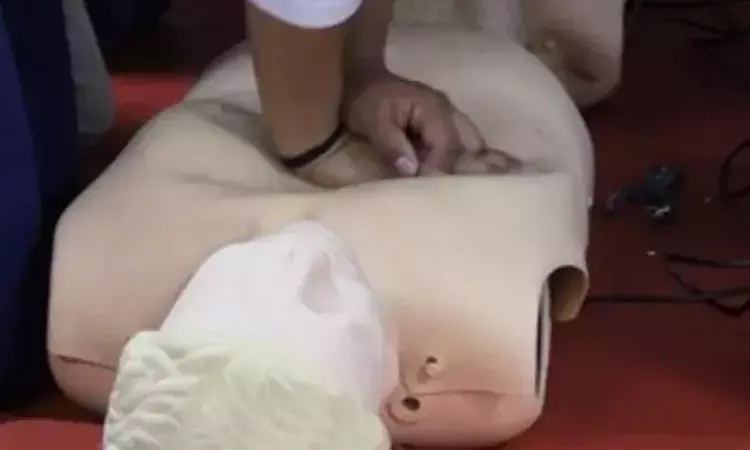- Home
- Medical news & Guidelines
- Anesthesiology
- Cardiology and CTVS
- Critical Care
- Dentistry
- Dermatology
- Diabetes and Endocrinology
- ENT
- Gastroenterology
- Medicine
- Nephrology
- Neurology
- Obstretics-Gynaecology
- Oncology
- Ophthalmology
- Orthopaedics
- Pediatrics-Neonatology
- Psychiatry
- Pulmonology
- Radiology
- Surgery
- Urology
- Laboratory Medicine
- Diet
- Nursing
- Paramedical
- Physiotherapy
- Health news
- Fact Check
- Bone Health Fact Check
- Brain Health Fact Check
- Cancer Related Fact Check
- Child Care Fact Check
- Dental and oral health fact check
- Diabetes and metabolic health fact check
- Diet and Nutrition Fact Check
- Eye and ENT Care Fact Check
- Fitness fact check
- Gut health fact check
- Heart health fact check
- Kidney health fact check
- Medical education fact check
- Men's health fact check
- Respiratory fact check
- Skin and hair care fact check
- Vaccine and Immunization fact check
- Women's health fact check
- AYUSH
- State News
- Andaman and Nicobar Islands
- Andhra Pradesh
- Arunachal Pradesh
- Assam
- Bihar
- Chandigarh
- Chattisgarh
- Dadra and Nagar Haveli
- Daman and Diu
- Delhi
- Goa
- Gujarat
- Haryana
- Himachal Pradesh
- Jammu & Kashmir
- Jharkhand
- Karnataka
- Kerala
- Ladakh
- Lakshadweep
- Madhya Pradesh
- Maharashtra
- Manipur
- Meghalaya
- Mizoram
- Nagaland
- Odisha
- Puducherry
- Punjab
- Rajasthan
- Sikkim
- Tamil Nadu
- Telangana
- Tripura
- Uttar Pradesh
- Uttrakhand
- West Bengal
- Medical Education
- Industry
Availability of large number of CPR-trained laypersons is need of hour: MoS Health

These life saving skills shall be tailored to the needs of recipients and must be easy to acquire so that doctors, nurses and paramedical staff can be trained accordingly, Union Minister Bharati Pravin Pawar said.
New Delhi: Union Minister Bharati Pravin Pawar on Wednesday said there is a need for a large number of CPR-trained laypersons as they are the first responders in a medical emergency, and stressed that basic life-saving skills must be known to everyone.
The minister of state for health also inaugurated a Comprehensive Resuscitation Training Centre (CRTC) at the Vardhman Mahavir Medical College (VMMC) and Safdarjung Hospital, a health ministry statement said.
Also Read: Epinephrine as good as epinephrine and vasopressin combo in pediatric CPR: study
The first batch to be trained in life-saving skills (LSS) at the centre has been oriented, it said.
Training of all healthcare providers in saving lives of patients in the event of an emergency is a continuous process and ideally everyone working in any hospital must not only learn these life-saving skills but also periodically get updated in these skills, Pawar said.
''These life-saving skills shall be tailored to the needs of recipients and must be easy to acquire so that doctors, nurses and paramedical staff can be trained accordingly,'' she said.
Basic life-saving skills must be known to all healthcare workers because prompt and appropriate action can save a life, the minister said. "Creating public awareness and providing training to the general population, particularly to the youth, can be instrumental in providing immediate help to a victim who has suffered,'' she said.
''Adequate and timely intervention by bystanders can save the life of a patient whose heart may have stopped beating, as every minute counts,'' Pawar said.
She said simple procedures like chest compressions at an adequate rate and depth can be taught to anyone and these can help a patient and improve his or her chances of survival if continued till medical help is available. Pawar said that availability of a large number of cardiopulmonary resuscitation (CPR) trained laypersons is the need of the hour as they are the first responders in the event of a medical emergency, the statement stated.
She emphasized that empathy and compassionate care are also cornerstones of the treatment offered to a patient.
It is the core responsibility of a healthcare provider and of every member of the care team, she said.
''Patients spend a significant portion of their time interacting with the nurses, medical assistants, and receptionists. These interactions can provide many opportunities for demonstrating compassion and empathy toward patients," Pawar said. Therefore, training, encouraging, and ensuring support staff to engage in compassionate, empathetic patient care will significantly influence a patient's overall experience, she said.
Also Read: Can Passive Leg Raising During CPR Improve Outcomes In out-of-hospital cardiac arrest?
Medical Dialogues Bureau consists of a team of passionate medical/scientific writers, led by doctors and healthcare researchers. Our team efforts to bring you updated and timely news about the important happenings of the medical and healthcare sector. Our editorial team can be reached at editorial@medicaldialogues.in.


